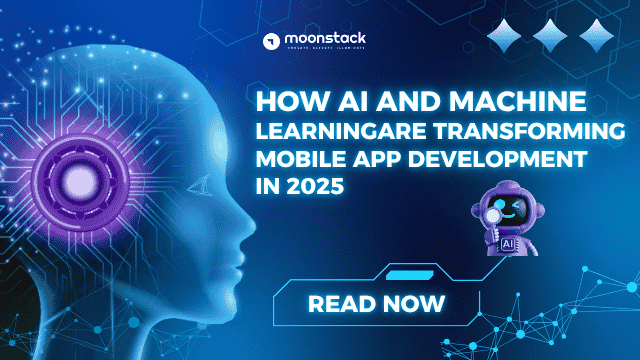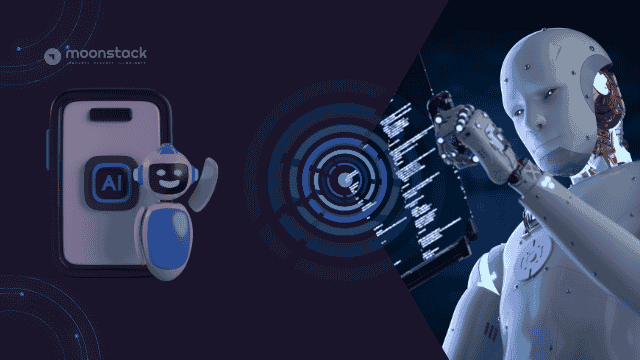Future of Digital Marketing Careers: Top Skills & Strategies to Dominate in 2025


AI and ML are being integrated into popular app development frameworks such as React Native, Flutter, and Swift, opening up new possibilities for developers.
Dynamic User Interfaces: Artificial intelligence can monitor user interactions in real time and adapt the UI to improve usability. For example, an e-commerce app built using React Native can reorganize product listings based on user preferences and browsing behavior.
Predictive Analytic: Machine learning algorithms can be integrated into applications to deliver predictive analytics. For example, a fitness app can forecast user goals and offer workout regimens based on previous activity data.
AI-Powered Chatbots: Chatbots that use NLP and ML can be smoothly incorporated into apps to give quick customer help. These chatbots can answer complex questions, perform transactions, and even provide personalized recommendations.
AI-powered picture and voice recognition: technology can improve the functioning of apps. A healthcare app, for example, can analyze medical scans using image recognition, whereas a speech-enabled app allows users to operate features using voice commands.
Optimized Performance: Machine learning algorithms can monitor app performance and find areas for improvement. This is especially important for apps built using frameworks such as Flutter and Swift, where performance optimization is critical to providing a seamless user experience.
How AI and Machine Learning Are Revolutionizing Mobile Apps

Artificial intelligence (AI) and machine learning (ML) are revolutionizing mobile apps to provide better, more personalized user experiences. Businesses are leveraging technologies such as predictive analytics and AI-powered chatbots to improve functionality and engage their customers.
But how are AI and ML influencing mobile applications development in India? More significantly, how do businesses in India, USA, Sydney, Melbourne, and Brisbane profit from AI-powered mobile app development? Let’s look at the impact of AI and ML in mobile apps and how businesses may stay competitive by incorporating these technology.
1. Personalization and predictive analytic
AI-powered smartphone apps analyze user activity to provide tailored recommendations. This helps organizations improve engagement and increase conversions.
Netflix and Spotify, for example, employ artificial intelligence to recommend material based on previous viewing and listening habits. Similarly, eCommerce applications such as Amazon use AI-powered recommendations to boost purchases. According to studies, customized recommendations account for 35% of Amazon’s total sales, demonstrating the usefulness of AI in user engagement.
AI also supports predictive data analytics, which allows firms to anticipate client needs. Mobile banking apps, for example, use spending trends to provide financial insights and budgeting advice. AI can detect financial behaviors and recommend automatic savings programs, allowing users to make more informed financial decisions. This level of customization increases user engagement and retention.
2. AI-Powered Chatbots and Virtual Assistants
AI chatbots are transforming customer service by giving immediate, automated responses. Banking apps such as Bank of America’s Erica and Amazon Alexa are prime instances of AI-powered virtual assistants that simplify consumer transactions.
For Melbourne startups wanting to improve user experience, AI-powered chatbots can be a game changer. According to research, AI chatbots will manage 80% of client interactions by 2025, lowering response times and increasing efficiency.
AI chatbots provide seamless customer care by automating responses and learning from encounters, making them vital for firms looking to scale their customer service operations. AI chatbots may also manage numerous languages, allowing firms to expand their reach into worldwide markets.
3. Image and speech recognition
AI has substantially enhanced image and speech recognition capabilities, making apps more user friendly and accessible. Google Lens, for example, enables users to search using photos rather than words, but Apple’s Face ID improves security through facial recognition.
Voice recognition technology is also improving rapidly. According to Statista’s 2023 study, the global speech recognition market is predicted to reach $27.16 billion by 2026, owing to its incorporation into mobile apps, smart assistants, and security systems.
Integrating AI-powered image and speech recognition into Brisbane businesses may increase security and user comfort, especially in banking, healthcare, and retail apps. AI-powered voice search is also transforming eCommerce, allowing consumers to search and shop hands-free while enhancing accessibility and user experience.
4. AI for Health and Fitness Apps
The healthcare and fitness industries are utilizing AI for real-time health monitoring, diagnostics, and predictive analytics. Fitbit and other apps utilize artificial intelligence to track user activity and make personalized fitness suggestions.
AI in mobile health apps is also accelerating telemedicine growth. AI-powered diagnostic tools, such as those found in the Babylon Health app, analyze symptoms and offer preliminary health assessments, minimizing the need for in-person consultations.
AI-powered smartphone apps can also help with mental health support. Apps like Woebot use artificial intelligence (AI) to deliver cognitive behavioral therapy (CBT) and mental health support via chatbot interactions. AI-powered mobile health apps can help users track their emotional states, stress levels, and sleep patterns, providing useful insights for enhancing overall well-being.
5. Fraud detection and cybersecurity
With cyber risks on the rise, AI plays an important role in fraud detection and security. PayPal and other major banking apps utilize AI-powered technologies to detect suspicious transactions in real time, eliminating fraud before it occurs.
AI-powered security systems analyze massive volumes of data to detect patterns of fraudulent conduct. Juniper Research estimates that AI-based fraud prevention will save banks $10 billion per year by 2027.
AI-powered authentication technologies, such as biometric recognition and multi-factor authentication, help to improve mobile app security. AI can also detect phishing attempts and malware threats, providing real-time defense against cyberattacks. For organizations that handle safe transactions, AI-powered fraud detection improves consumer confidence and financial security.
6. AI for eCommerce and Retail Apps
Retail and eCommerce apps use AI for:
✔ Intelligent search and tailored recommendations.
✔ Dynamic pricing and demand forecasting.
✔ Automated customer support.
For example, Amazon and Shopify deploy AI-powered chatbots and smart assistants to improve the customer experience and increase sales. An AI-powered recommendation engine may boost conversion rates by up to 30%, making it an indispensable tool for online merchants.
AI is also transforming inventory management and supply chain operations. Machine learning models predict demand variations, optimize stock levels, and reduce waste, resulting in more efficient operations.
Implementing AI-driven features in your mobile app can boost conversion rates and customer happiness for Australian eCommerce firms. Check out our eCommerce app development options.
7. AI in Mobile Gaming
Artificial intelligence is transforming the game industry by improving NPC behavior, real-time personalization, and immersive experiences.
For example, games like Red Dead Redemption 2 use AI to generate intelligent non-playable characters (NPCs), making gameplay more dynamic and entertaining. AI modifies NPC behavior based on player actions, resulting in a more realistic gaming experience.
AI-driven procedural content generation enables games to dynamically produce new levels, missions, and obstacles. This technology powers popular games such as Minecraft and No Man’s Sky.
AI is also boosting the player experience with real-time difficulty modifications. Machine learning algorithms evaluate player performance and adjust difficulties accordingly, making games more engaging for both casual and competitive players.
At Moonstack, our expert team specializes in building innovative, AI-powered mobile applications for your business needs. Whether you’re looking to integrate advanced machine learning, intelligent automation, or personalized user experiences, we deliver secure, scalable, and high-performance solutions that help your brand stay ahead in 2025’s competitive digital landscape. Partner with moonstack.co to turn your vision for AI-featured apps into reality.
Connect with Moonstack
Ready to take the first step towards unlocking opportunities, realizing goals, and embracing innovation? We're here and eager to connect.


